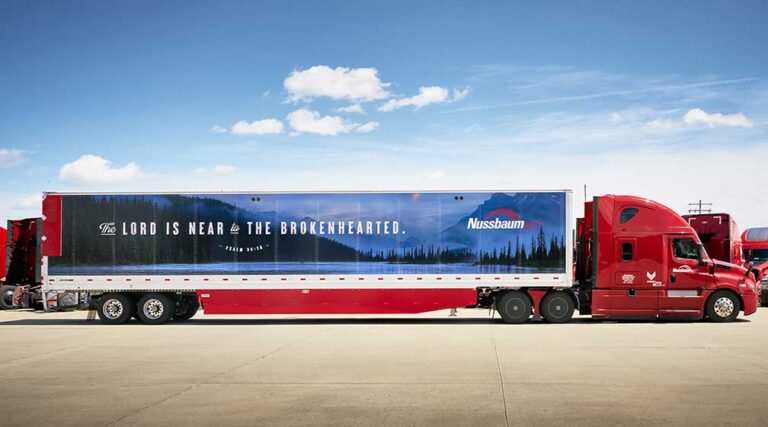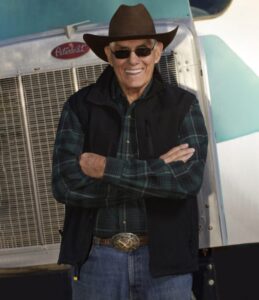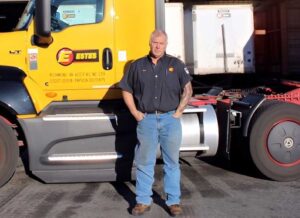It’s not a particularly novel thing for a company executive to say investing in people is their company’s primary strategy for success — but relatively few back up those platitudes with real action.
That’s not the case at Illinois-based Nussbaum Transportation. This company has earned a reputation for putting serving people at the top of the company’s priorities both internally and externally.
“I don’t want to sound cliché when I say this, but our focus is really on people, and it shows,” said Brent Nussbaum, second-generation CEO. “I think if you focus your attention on your people, your people take care of your customers — and your customers recognize that, and they bring you more business.”
Nussbaum, who took over as CEO in 2000, says keeping people foremost in the running of the business has paid off on several important metrics, not all of which show up directly on a balance sheet.
The company’s turnover rate is low, and morale is high, in part due to the lengths management goes to communicate regularly and effectively with the front lines. That behavior is in turn modeled by employees to the outside world.
“Constant communication with your customer sounds fairly normal, but you have to evolve your driver into that role,” Nussbaum said. “You can’t just say, ‘Our people in operations take care of that.’
“Our drivers need to feel like they’re a part of that process,” he explained. “One of the ways that we keep our people informed — and this drives everything else — is presence. Every quarter, we’re sharing our finances with all of our employees, including our drivers.”
Nussbaum encourages employees at all levels to ask questions and provide valuable feedback.
“We do what we call ‘Dashboard Radio,’” he said. “Every two weeks, we’ve got a Dashboard Radio program. It might involve somebody in operations, somebody in maintenance, somebody in human resources or safety, somebody in recruiting.”
These programs do more than just provide information.
“Drivers are allowed to call in, if they’re sitting still, and be a part of the conversation and ask questions,” Nussbaum explained. “That keeps them informed. I’m convinced that an informed driver wants to do better for their employer.”
This kind of all-for-one buy-in has helped the 79-year-old company remain nimble in changing times, one of the most existential examples of which happened when Nussbaum took the reins.
“We grew up in LTL. Up until 2001, LTL was two-thirds of our business, and the other third was full truckload,” he said. “We recognized the market was shifting away from LTL toward full truckload as big-box stores were coming into play back in the late ’90s. When they ordered, they ordered in truckload quantities.
“The one thing that we were always really good at was servicing our customers on the LTL side — but we realized we couldn’t survive long-term as a niche LTL carrier,” he continued. “So, we exited LTL in 2001, downsized the fleet, started over again with a small truckload fleet, and grew it. Along the way, instead of just hauling irregular route loads, we began dedicated operations. Today, about a third of our business is dedicated and a third of our business is irregular route.”
During the strategy’s build-back phase, company leadership spotted opportunities that fell between LTL and truckload categories. They capitalized on those opportunities using logistical innovation and creative strategy.
“Our focus is going to be on manufacturers that need dedicated service between their plants,” Nussbaum said. “Sometimes we found manufacturers or distributors that don’t have dedicated operations and combined them into what I would call a semi-dedicated-type operation, where you’re using two one-way moves (and combining them) into a dedicated-type operation from two different customers.”
The carrier also hasn’t shied away from adopting new technologies to help boost efficiencies and streamline operations. Nussbaum describes these new advancements as one of the biggest secret weapons in the company’s toolbox.
“I would say the biggest change in transportation today has been in the growth in information technology,” he said. “Business analytics have transformed our business to drive more informed, quicker decisions, which drives greater productivity and efficiency.
“We’ve got a huge IT department, and we build a lot of our own solutions. We are constantly using the data to help us to drill down into our costs and that’s another big piece,” he continued. “The setup of a data warehouse has put very detailed information into the hands of everyone from managers to frontline people and this helps push decisions to the frontline who can make decisions for the business rather than having to wait for a manager.”
Nussbaum says the company’s experiences of the past two decades have illustrated the absolute necessity for technological know-how as a critical component of future success.
“I would say that this industry is going to become more data-driven than ever before and I think the carriers that are able to do that will not only survive, but they’re going to thrive,” he said. “The people that are trying to run their companies by the seat of their pants, which is typically the way things have always been, are not.”
These strategic and operational elements have combined to deliver great success. The company’s head count is up to 715,515 of whom are drivers moving 550 trucks and more than 1,500 trailers, the vast majority of it dry van.
The spot market represents 10% of business volume at most, which helped insulate the firm from the recent slowdown in that sector, volatility that Nussbaum leadership rightly predicted.
“We stayed in full truckload and just focused on manufacturers that were in the Midwest — and we’ve got a large number of them that allow us to keep our lanes static and allow us to build density,” Nussbaum said. “We actually had a pretty good year last year.”
Nussbaum Transportation was founded by Brent Nussbaum’s father, the late Alden Nussbaum, in 1945. The younger Nussbaum grew up working for the family business, taking on miscellaneous tasks at age 13.
“I started at the bottom — literally at the bottom — cleaning bathrooms and whatnot,” he said with a laugh. “I’m not embarrassed to say that.”
In the years to come, Brent Nussbaum would serve in a variety of roles, graduating to be a driver after high school. After that, he spent 15 years in operations before stepping away from the company for a while. During this time, he earned undergraduate degrees in international management and business management, as well as a master’s in international management, before coming home to resume his career at the head of the family business.
Nussbaum gives the lion’s share of credit for the positive momentum Nussbaum Transportation enjoys today to his leadership team and the company’s employees. Asked what separates consistency from complacency, Nussbaum, predictably, circled back to the importance of people.
“(It) really comes down to, ‘Are your people really engaged in your business?” he said. “We literally just finished an employee engagement survey here, and for the second year in a row we have succeeded. This year we got 93% of all of our people to be a part of that survey. When we saw the results, 88% showed as completely engaged. When you’ve got that kind of engagement, that’s just absolutely best in class.
“I think you’ve got to figure out a way to engage your people — and it isn’t just how well you execute externally,” he continued. “We are a faith-based organization. We call ourselves a ministry that happens to be in trucking. Our goal is to positively impact those we come into contact with. We do that not only with the way we treat our people but also through the programs we use to help a driver be not just a driver, but to give him a prayer path. I would say I think we do a pretty good job at it.”
This article originally appeared in the March/April 2024 edition of Truckload Authority, the official publication of the Truckload Carriers Association.
Dwain Hebda is a freelance journalist, author, editor and storyteller in Little Rock, Arkansas. In addition to The Trucker, his work appears in more than 35 publications across multiple states each year. Hebda’s writing has been awarded by the Society of Professional Journalists and a Finalist in Best Of Arkansas rankings by AY Magazine. He is president of Ya!Mule Wordsmiths, which provides editorial services to publications and companies.











